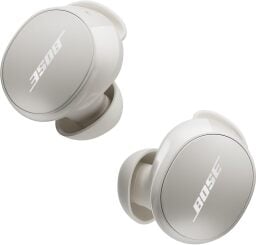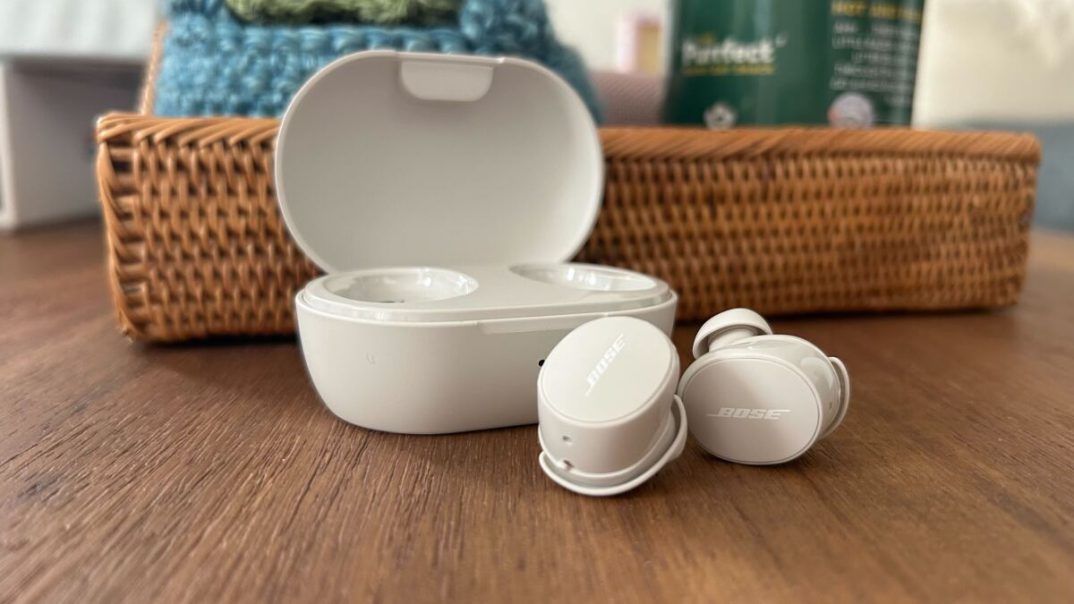Table of Contents
Table of Contents
Table of Contents
The sound and battery life are hard to beat
The Bose QuietComfort earbuds live up to their name, for the most part
The active noise cancellation didn’t impress, but it did the job
The touch controls worked a little too well
Bose’s Bluetooth connection struggles
The app could use some work
Bose QuietComfort vs. Bose QuietComfort Ultra earbuds
Are the Bose QuietComfort earbuds worth it?
How We Tested
Historically, if you wanted a pair of earbuds with good noise cancellation, impressively balanced sound, decent battery life, and the ability to switch between your devices with ease, you were looking at a price tag of at least $200 or so. Likely more.
That said, the tides are starting to change. This past September, Apple released its first non-Pro model of noise-cancelling earbuds, the AirPods 4, for $179.99. Now Bose has entered the ring with the Bose QuietComfort earbuds, with a price tag of $179 flat, which makes them $120 cheaper than the Bose QuietComfort Ultra earbuds.
SEE ALSO:
I’m in love with my new Bose noise-canceling earbuds and I want everyone to know it
The Ultra earbuds from Bose are some of the Mashable staff’s favorite on the market, and I’ve tested my fair share of the QuietComfort line: I owned the QuietComfort II headphones as my personal headphones for years, tested the QuietComfort 45 headphones, and the QuietComfort Ultra headphones for Mashable’s headphones buying guide.
With all of the above headphones, I found they lived up to their name: I could easily wear them all day, and appreciated that their active noise cancellation worked to make the world around me quiet. With that in mind, I had to see how the latest addition to the QuietComfort line stacked up.
The sound and battery life are hard to beat
Right away, I was impressed by the sound quality of these earbuds. While I wouldn’t consider myself the harshest audiophile in the world, I found that the lows, mids, and highs of songs came through balanced and clear, becoming only the tiniest bit muddled at higher volumes. They sounded as great with the The Marías Tiny Desk performance as they did with Chappell Roan’s Austin City Limits set, and as someone who loves the sound of live music but not always the experience of going to see it, I appreciated what these earbuds could do.
SEE ALSO:
Why is the internet fighting over Chappell Roan?
The companion app does have an equalizer, with five presets and the option to save a custom setting, but it’s good news that these earbuds sound solid out of the box — it was genuinely hard for me to tell the difference in balance with the equalizer on, whether I was listening to classic rock or piano concertos. If you have more sensitive ears than mine, you might notice more of a difference — at the very least, the equalizer was easy to adjust.
Choose between five equalizer presets.
Credit: Screenshot: Bose
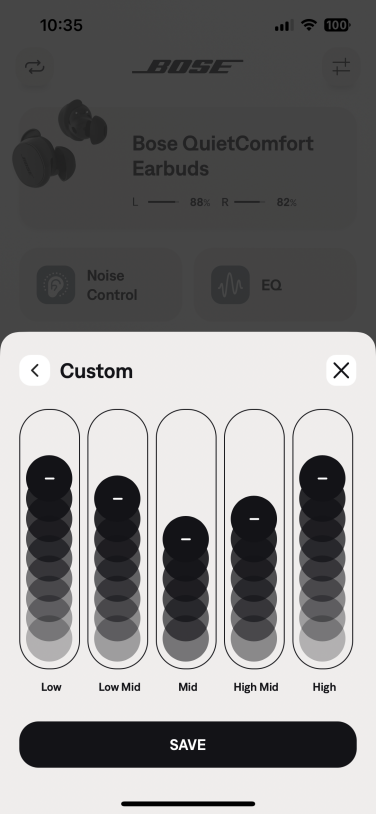
Or make your own custom settings.
Credit: Screenshot: Bose
The battery life, on the other hand, I truly have no notes about. I use the first-generation AirPods Pro as my usual earbuds, and I have for a couple of years, so I’m used to noise-cancelling earbuds holding on for about four hours (or less) before needing to juice up in their case. In my three weeks of testing these earbuds, that didn’t happen to me once, despite my best efforts to wear the battery life down.
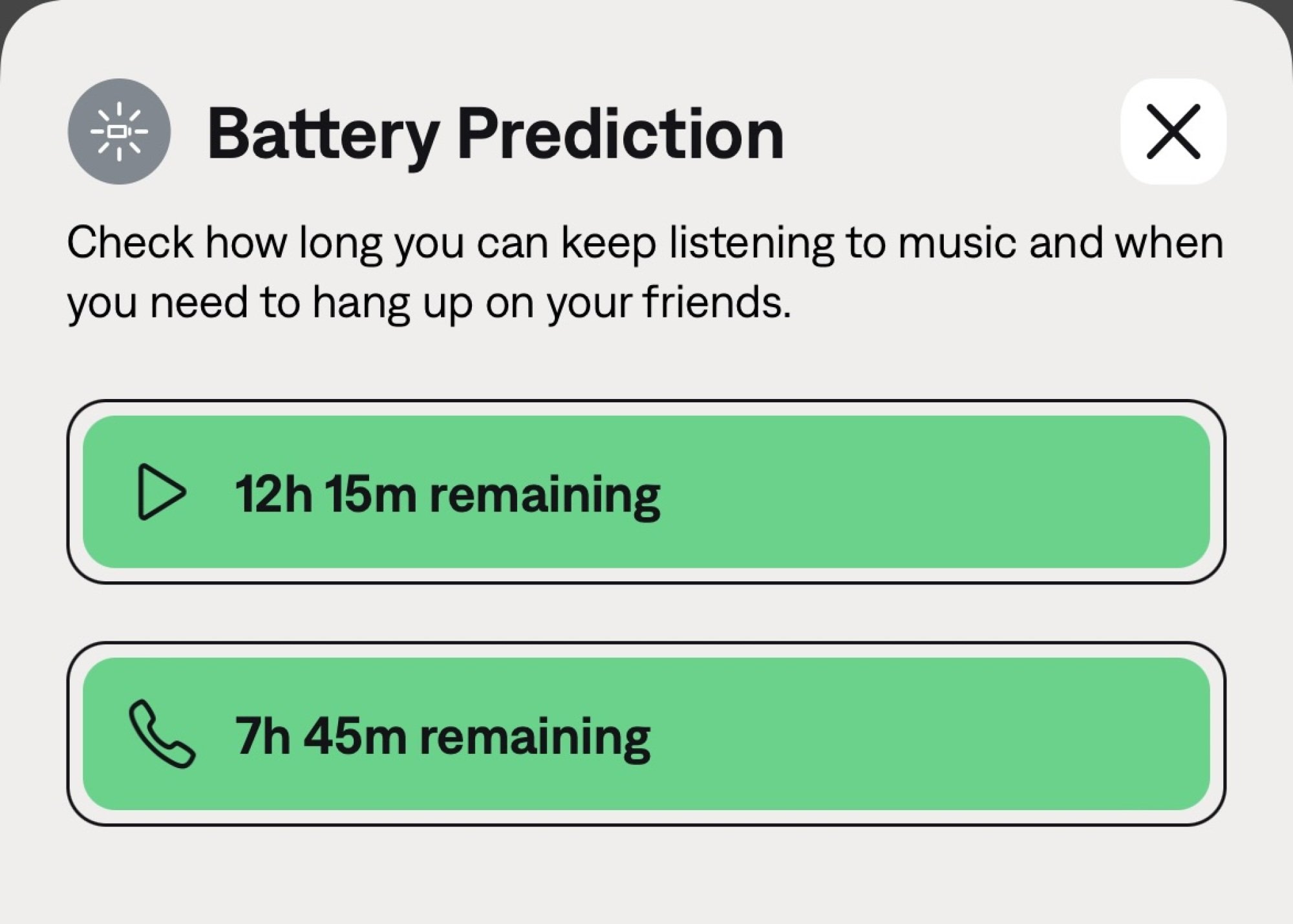
It was hard to make a dent in the battery life.
Credit: Screenshot: Bose
I kept them connected to two devices every time I had them on, wouldn’t bother putting them back in the case if I stopped playing audio for a bit, and had noise cancellation on at all times. At most, I probably got five hours of active use of the headphones in a day, and I ended up with battery life to spare.
The Bose QuietComfort earbuds live up to their name, for the most part
All-day battery life means less if the earbuds that battery is powering can’t promise comfortable all-day wear.
SEE ALSO:
Review: Bose QuietComfort Ultra are the most comfortable headphones I’ve ever worn
For me, that was a promise that Bose more than delivered on. Although, it took a few tries to find the right combo of ear tip and stability band sizes for the earbuds to fit snugly but comfortably in my ear. I usually switch to the small ear tips as a rule, and that worked well here, but the medium stability band worked better for me — the small one was too big, and made my ear sore within an hour of wear, while the medium one gave me basically no soreness. Swapping out the bands was easy, with a small notch in the earbud making it clear which way to orient the band. Once they were in, I never had an issue with them moving.
Different ear tips and bands allow you to find a comfortable fit for your ear.
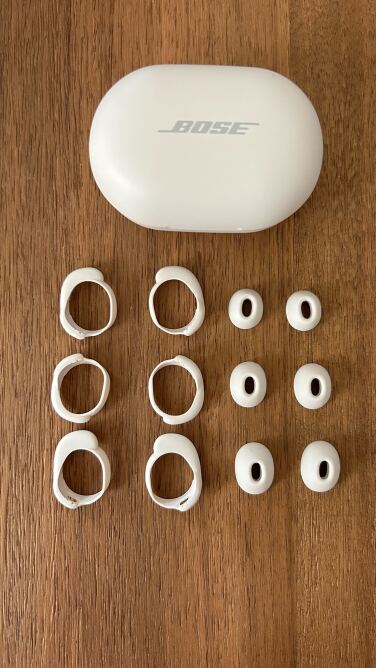
Credit: Bethany Allard / Mashable
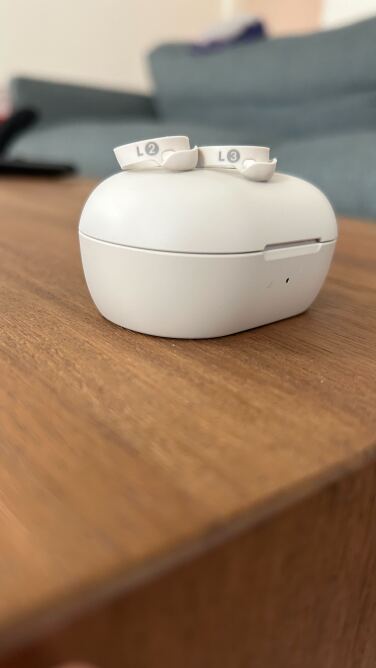
Credit: Bethany Allard / Mashable
Maybe this doesn’t seem like such a big deal to some, but as someone who struggles to find earbuds that actually stay put, even when I’m sitting still, I was kind of wowed these Bose earbuds stayed in place. This might just apply to my weird ear shape, but if you’re someone who doesn’t like the fit of AirPods, these may work way better for you.
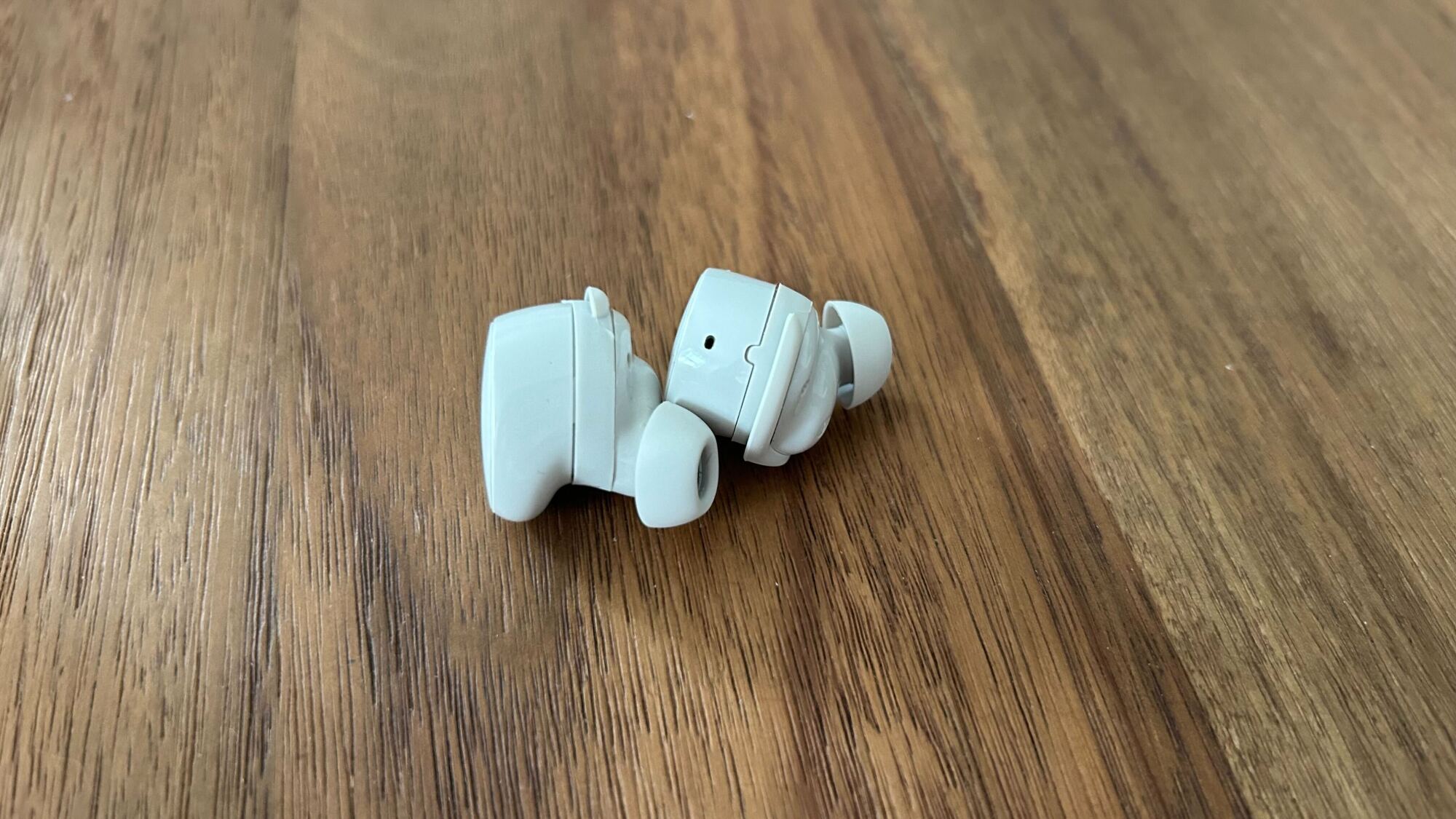
My combo fit my ear amazingly.
Credit: Bethany Allard / Mashable
I will caveat my amazement with the fact that earbud fit can vary from person to person. Mashable Shopping Reporter Sam Mangino tried out these earbuds and found that the stability band regularly came loose when she took the earbuds out. For her ears, she found that compared to the QC Ultra earbuds, these standard QC earbuds were nowhere near as secure or comfortable. (Mashable contributor Timothy Beck Werth also found the Ultra earbuds to be incredibly comfortable, giving him no ear fatigue during up to seven hours of wear). All this to say, always try on earbuds when you can and take advantage of return policies wherever possible.
The active noise cancellation didn’t impress, but it did the job
Where Mangino and I agreed was on the active noise cancellation — it’s serviceable, especially for the price point, but it’s certainly not at the same level as Bose’s other headphones. Still, considering the next cheapest pair of QuietComfort headphones or earbuds are $120 more expensive, the noise cancellation did seem to meet the price point.
SEE ALSO:
We’ve tested tons of noise-cancelling headphones and these are the ones we’d take on a plane
That’s not to say it was bad — it was certainly better than other earbuds I’ve used in slightly cheaper price ranges, and it’s definitely helped if you’re playing music while using it. With ANC on, I could make out the words of my boyfriend talking in the next room over from me, but just barely. With music, his voice all but disappeared. To compare, when I tested the Bose QuietComfort Ultra over-ear headphones last year, his voice was nearly completely drowned out with just the noise cancellation and no music.
The touch controls worked a little too well
There are some earbud features that should be defined by ease, like connecting via Bluetooth. There are others that I would prefer to have a bit of friction, and at the top of that list is touch control. I want touch controls to be intuitive but not terribly sensitive, and unfortunately, the Bose QuietComfort earbuds fall firmly in the latter category.
These earbuds not only responded to the lightest tap of my fingers, but also — get this — the strands of my hair. It took a good 10 minutes into the first walk I took with these to figure out why my music kept pausing, until I realized the slightest sway of my hair against the earbuds was activating the touch response (it wasn’t even breezy out).
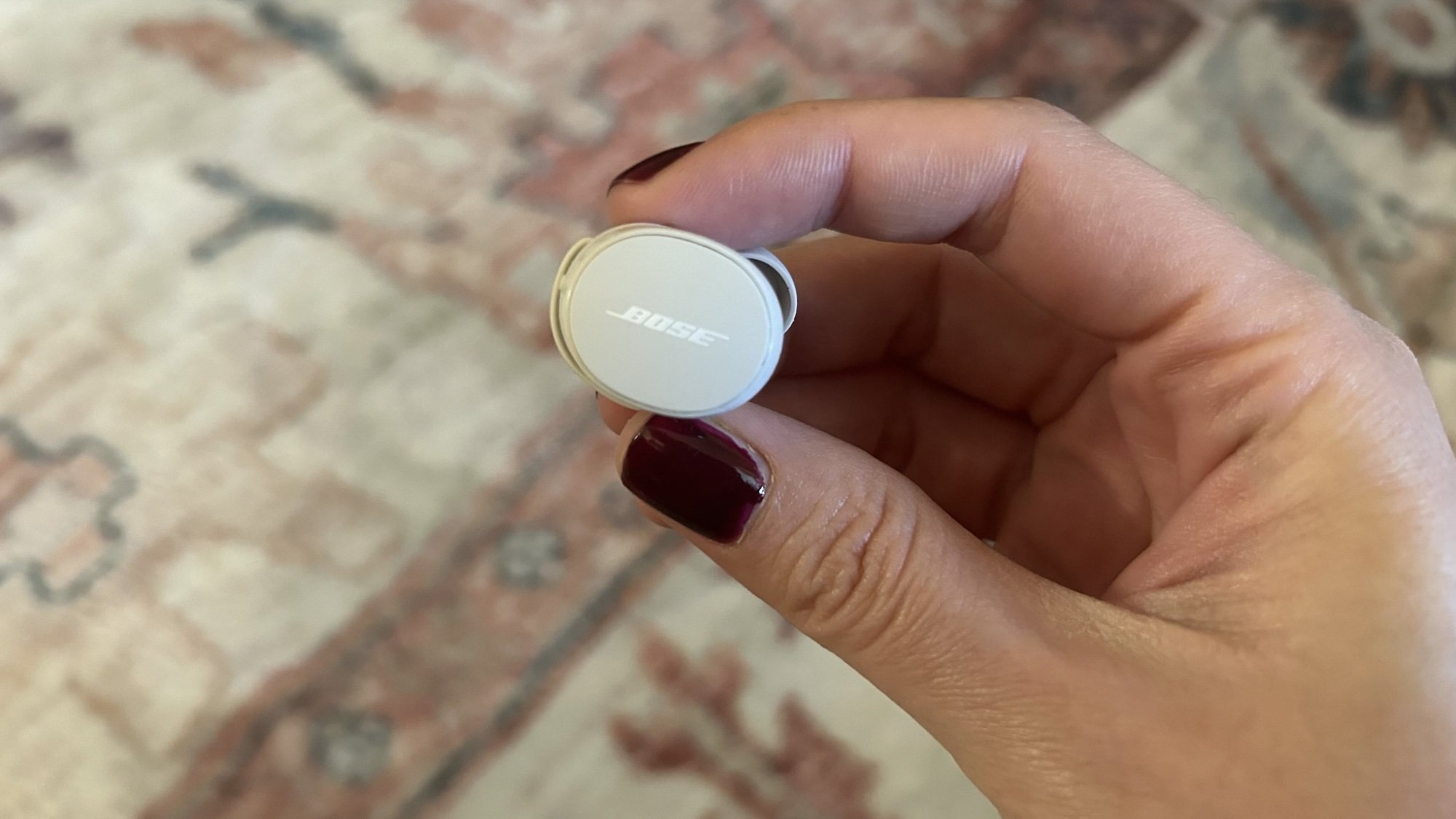
The flat outer surface can be used for touch controls, but it does its job too well sometimes.
Credit: Bethany Allard / Mashable
Though there is a lot of customization available for the touch controls via the app (more on that a little farther down), there isn’t a way to fully toggle the touch controls off — as in, you don’t hear a soft beep that something has touched the earbud surface. Though that’s not unheard of, when earbuds are this sensitive, I not only want but need that option, so I can go for a walk without a) stopping to toggle touch controls off and b) continuing to have my music punctuated by the beeps of my earbuds because my hair happened to brush over them.
Bose’s Bluetooth connection struggles
As I mentioned above, the Bose QC II headphones used to be my personal pair — operative phrase being “used to be.” While I loved how comfortable they were and thought the ANC more than did the job for me, as someone who switches between my laptop and phone for audio frequently, I started looking at other headphone brands.
Because I luckily test headphones for a living, I was able to see firsthand if this was just an issue with an older model of Bose headphones. But both the Bose QC 45s and QC Ultras had trouble seamlessly switching between devices, often requiring me to turn off the headphones for minutes at a time before attempting to switch devices, or in more egregious cases, forgetting the headphones from my device and reconnecting them all over. Other Mashable shopping reporters have encountered the same issues when testing at least two separate pairs and models of Bose headphones.
SEE ALSO:
We tested the best Bose headphones of 2024
All this to say, I wasn’t waiting with bated breath the first time I switched the Bose QuietComfort earbuds from my phone to my laptop, and though I had my fingers crossed, the same issues came up. In three weeks of testing, I’ve forgotten and reconnected these headphones at least as many times. I’ve paused my phone audio, counted to 10, and hit play on my laptop only for the audio to start, play for a few seconds, and then pause.
I became well acquainted with these two screens over the course of three weeks.
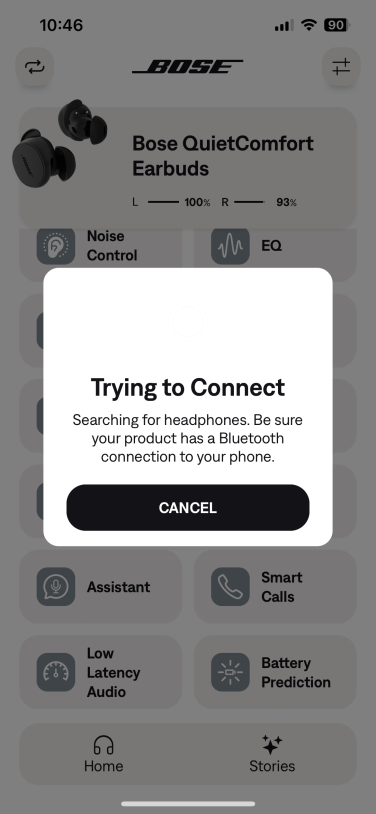
Credit: Screenshot: Bose
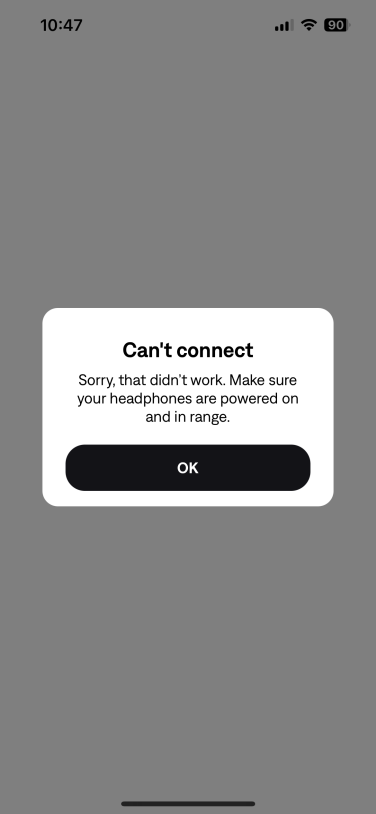
Credit: Screenshot: Bose
At best, this connection issue is annoying, and at my least generous, I’m inclined to say Bose needs to stop claiming their headphones and earbuds have multi-point pairing until they figure this out. More affordable model or not, at $179, I not only expect better, but I have tested better for cheaper.
The earbuds also struggled to reliably connect when I was wearing one earbud, whether that be a product of just putting one in, taking one out momentarily, or putting one down for an indefinite amount of time. In the latter two cases, I figured it was likely due to the auto-pause feature built into the earbuds — this likely won’t be an issue for the majority of users, but if like me you often wear one earbud, it’s definitely something to be aware of.
The app could use some work
Speaking of struggles, let’s talk about the Bose QuietComfort earbuds app. For some reason, this is not the regular Bose headphones app, but its own dedicated app, just for these earbuds. And for some reason, Bose decided to make 12 different panels you have to click into, making it much busier visually than the standard Bose app.
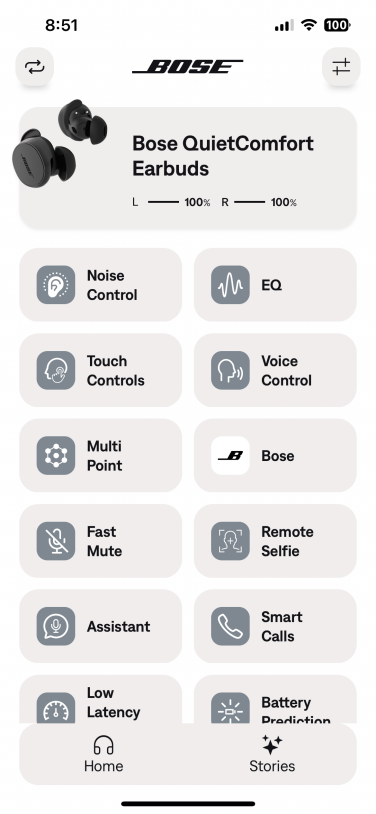
The Bose QCE app landing screen.
Credit: Screenshot: Bose
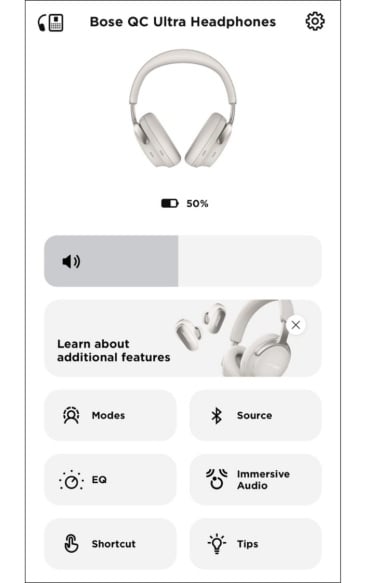
Versus the regular Bose app.
Credit: Screenshot: Bose
Simply put, there is no need for 12 separate menu panels in any headphone app. While you do get a fair amount of customization with the earbuds app, with touch controls, voice controls, and low latency audio settings, there is overlap that makes it feel like panels could have been easily consolidated, with some feeling like they were missing information.
For instance, the multipoint menu lets you toggle multipoint pairing on and off, but it doesn’t let you see or switch between specific devices like the other Bose app. The battery prediction section is a neat idea, but conveys similar information as the battery indicators up top — and you can’t find information on the battery life left on the case anywhere, which feels like it would’ve been more useful than having two separate measures of the earbud battery life.
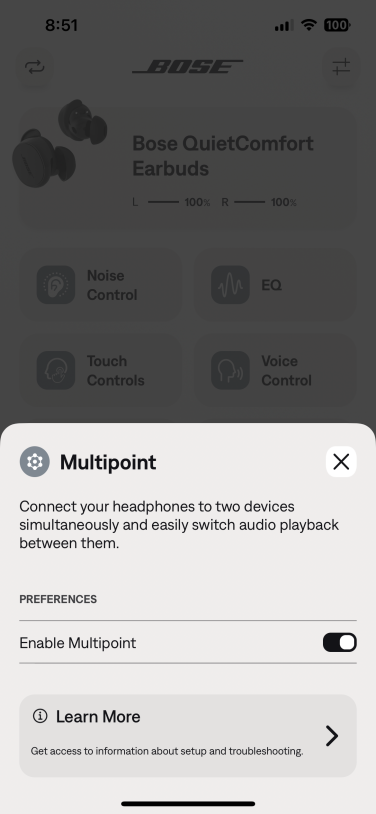
The multipoint pairing menu in the Bose QCE app.
Credit: Screenshot: Bose
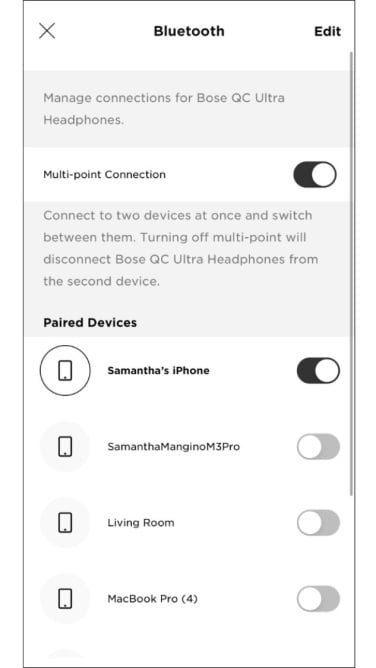
Versus the regular Bose app.
Credit: Screenshot: Bose
On a final design note, I didn’t love how the panels opened to a half-screen menu — it just made the experience of adjusting settings feel visually busier than necessary. Also, this app didn’t need two separate menu items, “Bose” and “Stories,” linking out to the Bose website.
Bose QuietComfort vs. Bose QuietComfort Ultra earbuds
As I mentioned up top, the Bose QuietComfort Ultra earbuds are one of the Mashable staff’s favorite pair of earbuds — and our top pick for the best noise-cancelling earbuds on the market.
When you’re shelling out the $299 for the Ultras, here’s what the extra $120 gets you:
-
Top-of-the-line noise cancellation
-
Spatial audio
-
A secure and comfortable fit
-
Up to six hours of battery life
In comparison, here’s what you get with the standard QuietComfort earbuds:
-
Decent, but not amazing noise cancellation
-
Customizable touch controls with the companion app
-
A good fit depending on your ear shape
-
Up to 8.5 hours of battery life
Are the Bose QuietComfort earbuds worth it?
At the end of the day, while the Bose QuietComforts do have some issues that I’d rather not see on a pair of $179 earbuds, they also sound much better than I’d expect at this price point and have excellent all-day wear potential, both in comfort and battery life.
If you’re looking for the best noise-cancelling Bose has to offer, you likely won’t regret investing more. On the other hand, if you’re trying to get earbuds that sound as good as they can under $200, with exceptional battery life added in, picking up the QuietComfort earbuds is an easy choice.
